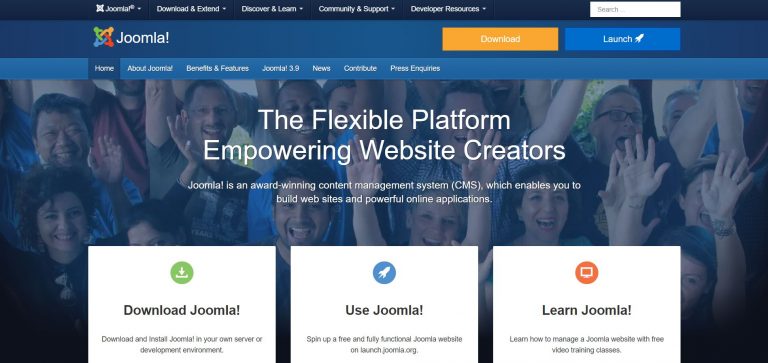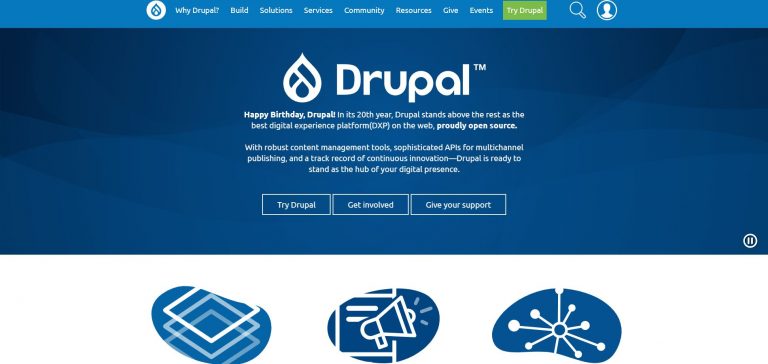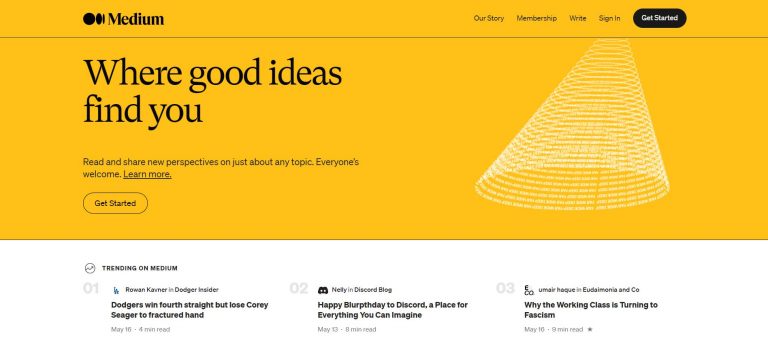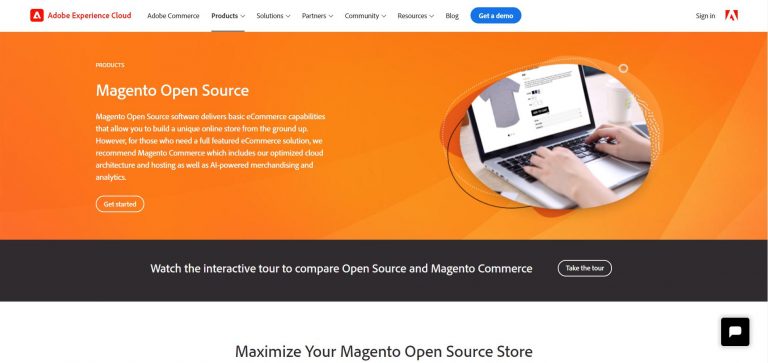WordPress has long been hailed king when it comes to website platforms, especially for bloggers.
But is WordPress the best option to suit your needs for SEO?
Yes, it earned its reputation as a solid platform offering the ability to customize and brand your website with an expansive number of plugins, tutorials, and forums
But WordPress isn’t necessarily the most user-friendly website builder on the market.
It’s not an all-in-one solution, which means you must rely on plugins in order to achieve your desired customization and functionality.
WordPress is also built on top of PHP, an open-source scripting language for web development that isn’t always the best solution for specific tasks and purposes you might need for your website.
Top 10 WordPress Alternatives to Build Your Website
If you’ve been wondering which web design platform is right for you and your SEO goals, take a look at this concise breakdown of the best alternatives to WordPress.
1. Joomla


Like WordPress, Joomla is an open-source content management system (CMS). Joomla itself is free, but you do have to pay for your own web hosting.
Part of Joomla’s appeal is its broad range of functionality that allows you to run any type of website – blogs, ecommerce, portfolios, informational websites, and more.
The downside to Joomla is that it isn’t ideal for beginners, so it’s best if you have some experience.
Key Features:
- Content Management System (CMS).
- Almost 6,000 extensions available.
- Traditional content editing (no drag-and-drop visual editor).
- Optimized for mobile (depending on the template).
- Blog module.
- Ecommerce store.
- Social media tools.
Pros:
- Free open-source software.
- Premade designs and templates.
- Access to source code.
Cons:
- No free subdomains or custom domains available.
- No customer support.
- Requires a PHP-enabled server to run.
- Fewer templates and extensions than WordPress.
2. Wix
If you’re looking for an easy, all-in-one platform that is fully customizable and doesn’t require third-party sites and plugins, look no further than Wix.
Advertisement
Continue Reading Below
This option houses everything you need – hosting, domain, website software – within the Wix platform, and the step-by-step guide helps beginners create a beautiful website without any prior experience.
Key Features:
- Full hosting solution.
- No software to self-install.
- Drag-and-drop visual builder.
- Extensions available.
- Optimized for mobile.
- Blog module.
- Ecommerce store.
- Social media tools.
Pros:
- All-in-one website builder and platform.
- Free version available.
- Premade designs and templates.
- Free subdomain available for all plans.
- Free custom domain available with paid plans.
- Customer support.
Cons:
- No option to retain full control of your site as you can with WordPress.
- No access to source code.
3. Squarespace
This all-in-one option allows you to easily create a website on Squarespace’s own fully hosted platform. You do not need prior experience to use this intuitive site builder.
Squarespace hosts all of its features in-house, meaning you can’t install third-party extensions or use custom coding.
Advertisement
Continue Reading Below
It’s a great solution for hobbyists and small businesses to build a professional site themselves, although it can be an expensive solution if all you’re doing is running a basic website.
Key Features:
- Full hosting solution.
- No software to self-install.
- Drag-and-drop visual builder.
- Extensions available.
- Optimized for mobile.
- Blog module.
- Ecommerce store.
- Social media tools.
Pros:
- All-in-one website builder and platform.
- Free version available.
- Premade designs and templates.
- Free subdomain available for all plans.
- Free custom domain available with an annual subscription.
- Customer support.
Cons:
- No option to retain full control of your site as you can with WordPress.
- No custom coding.
- No third-party extensions.
- No access to source code.
4. BigCommerce
If you’re looking for scalability in an SEO-friendly WordPress alternative, BigCommerce might be the right option for you.
It features strong SEO support and smooth multi-channel integration — and there are no platform fees or commissions.
Advertisement
Continue Reading Below
However, customer reviews weren’t overly favorable when it came to set up, and this ecommerce-targeted platform isn’t the best for small businesses or stores with tight margins.
Key Features:
- Full hosting solution.
- No software to self-install.
- Drag-and-drop visual builder.
- Extensions available.
- Optimized for mobile.
- Blog module.
- Ecommerce store.
- Social media tools.
Pros:
- High level of customization options.
- Over 100 themes to choose from (12 are free).
- No platform commission fees.
- Free subdomain available.
- Customer support.
Cons:
- No free version available.
- No access to source code.
- Pricing is based on revenue, which isn’t great if you have tight margins.
5. Shopify


One of the most popular ecommerce platforms on the market, Shopify is designed to help you sell products.
That gives this option a major edge in the post-COVID digital shopping era, especially if your Shopify site is optimized for SEO.
Advertisement
Continue Reading Below
Although Shopify can handle blogging and other niches, it isn’t the best solution for anything outside of ecommerce needs.
Key Features:
- Full hosting solution.
- No software to self-install.
- Drag-and-drop visual builder.
- Extensions available.
- Optimized for mobile.
- Blog module.
- Ecommerce store.
- Social media tools.
Pros:
- All-in-one website builder and platform.
- Premade designs and templates.
- Free subdomain available.
- Customer support.
Cons:
- No free version available.
- No access to source code.
- Platform commission fees.
6. Medium
Rather than joining the others on this list as a site builder or web software, Medium stands alone as a publishing platform with its own community and user base.
If you’re a blogger looking for an inexpensive way to publish content, this is a great solution.
Advertisement
Continue Reading Below
But keep in mind that you don’t have customization options, meaning you can’t brand your own website. If you need a unique website with design control, Medium isn’t going to suit your requirements.
Key Features:
- Full hosting solution.
- No software to self-install.
- Optimized for mobile.
- Blog module.
- Limited social media tools.
Pros:
- Community site for blogs.
- Free version available.
- Medium Partner Program to earn revenue.
- Customer support.
Cons:
- No extensions.
- No ecommerce stores.
- No premade designs or themes.
- No free subdomains.
- No third-party extensions.
- No access to source code.
7. Drupal


Like WordPress and Joomla, Drupal is a CMS platform. The software is free, although you’ll have web hosting fees.
Drupal is one of the most technical and powerful CMS options on the market but it requires more skills to tap into Drupal’s full potential. This site building option is best suited for advanced users.
Advertisement
Continue Reading Below
Key Features:
- Content Management System (CMS).
- Over 47,000 modules available.
- Traditional content editing (no drag-and-drop visual editor).
- Optimized for mobile (depending on the theme you choose).
- Blog module.
- Ecommerce store.
- Social media tools.
Pros:
- Free open-source software.
- Premade designs and templates.
- Access to source code.
- Strong security and data encryption.
Cons:
- No free subdomains.
- No customer support.
- Requires a PHP-enabled server to run.
8. Weebly


If you’re looking for simple and affordable, Weebly might be up your alley. This site builder takes an all-in-one approach with the goal of making website creation accessible for everyone, not just programmers and web developers.
Weebly is revered for being user-friendly and straightforward but if you’re on the free plan, your website will be limited to only five pages.
Advertisement
Continue Reading Below
Key Features:
- Full hosting solution.
- No software to self-install.
- Drag-and-drop visual builder.
- Extensions available.
- Optimized for mobile.
- Blog module.
- Ecommerce store.
- Social media tools.
Pros:
- All-in-one website builder and platform.
- Free version available.
- Premade designs and templates.
- Free subdomain available.
- Inexpensive premium plans as low as $6.00 per month.
- Free custom domain available with premium plans.
- Customer support.
Cons:
- No option to retain full control of your site as you can with WordPress.
- No access to source code.
- Free version restricts you to a maximum of five pages.
9. Ghost
This platform is a WordPress contender when it comes to blogging but Ghost’s capabilities are limited for anything more.
If you’re in the right niche, Ghost is a simple and straightforward platform to suit your needs.
But if you know your website might grow, keep in mind that Ghost isn’t designed to scale a blog up into a business website or complex project.
Advertisement
Continue Reading Below
Key Features:
- Option to subscribe through Ghost’s hosting platform or download the free open-source. software to install on your own web server.
- Basic drag-and-drop visual builder.
- Extensions available through integrations with other tools.
- Optimized for mobile.
- Blog module.
- Ecommerce store (subscription only).
- Social media tools.
Pros:
- All-in-one website builder and platform.
- Free version available.
- Premade designs and templates.
- Free subdomain available with the paid version.
- Customer support.
- Access to source code.
Cons:
- Not compatible with all third-party web hosts.
- Highly specialized with limited capabilities beyond blogging.
- Not built to scale up into a business site or complex website.
10. Magento
Magento is an ecommerce-based platform with more bells and whistles than Shopify. And while it offers a ton of business features especially suited to large-scale enterprises, it’s not the easiest platform to use.
Magento specializes in ecommerce and not much else. If you want a website that capitalizes on different features, the investment that goes into Magento probably isn’t going to be worth your time.
Advertisement
Continue Reading Below
Key Features:
- Option to pay for Magento Commerce for a full hosting platform or download the free open-source software to install on your own web server.
- Drag-and-drop visual builder.
- Extensions available.
- Optimized for mobile.
- Ecommerce store.
- Social media tools.
Pros:
- All-in-one ecommerce platform or open-source ecommerce software package.
- Free version available.
- Designed for large-scale ecommerce.
- Premade designs and templates.
- Free subdomain available (mainly for setup and testing purposes).
- Customer support (paid version only).
- Access to source code with the downloadable version.
Cons:
- No blog module, although you can add it as an extension.
- Not optimized for web projects or website purposes outside of ecommerce.
- Steep learning curve for inexperienced users.
- Large investment for small-scale ecommerce.
Which Website Builder Is the Best Alternative to WordPress?
Every option on this list has its pros and cons. Which one is the best for you depends on your skill level, time commitment, learning curve, budget, and website needs.
With the right tools you, too, can build something incredible!
More Resources:
Image Credits
All screenshots taken by author, May 2021







You must be logged in to post a comment.